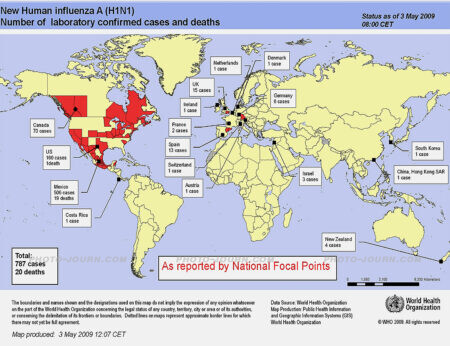An intergovernmental meeting of the World Health Organization (WHO) has failed to reach an agreement on sharing influenza virus research material and access to vaccines, with the US placing profits ahead of the threat of wide-scale, world-wide deaths from the current influenza A(H1N1), or Mexican swine flu, pandemic.
| The number of people infected by the influenza A(H1N1) virus has risen sharply in the past week. Video VOA News |
The impasse occurred despite a warning by Dr Thiravat Hemachudha, director of the WHO’s Collaborating Centre for Research and Training on Viral Zoonoses, that a second wave of the A(H1N1) influenza virus could occur as early as July.
In the past week the number of people infected by the influenza A(H1N1) virus has risen sharply, with the United States recording the highest number of cases, followed by Mexico where the pandemic began.
On Saturday the WHO reported an additional seven deaths, raising the number of people killed by the influenza A(H1N1) virus to 72, with 1,000 new confirmed cases reported in the previous 24 hours.
India, Turkey, Japan, Ecuador, Peru, Belgium, Cuba, Finland, and Thailand have all confirmed cases of influenza A(H1N1) in the last week.
According to Dr Hemachudha, the current situation is like a warning sign, reminding us that the big wave is coming. According to expectations the second wave should happen between two months to two years [after the initial outbreak].
As the number of people infected by the influenza A(H1N1) virus hit almost 8,500 cases in 38 countries, the two-day WHO meeting concluded with poorer countries dissatisfied at the stance of the US.
“Intellectual property” says US

Indonesia, one of the countries heavily hit by the outbreak, wanted vaccines produced by industrialised countries shared with developing nations which do not have the means to produce enough doses in the event of a global pandemic.
Poor countries argued that they should have access to the resulting vaccines, especially if the samples used to create them came from developing countries.
However, US delegates balked at this, insisting pharmaceutical companies should be able to claim the vaccines as intellectual property and earn royalties on them.
Coinciding with this Japan confirmed 13 students at a high school in the western city of Kobe had tested positive for influenza A(H1N1), bringing the total number of confirmed cases there to 25.
In nearby Osaka city there are nine suspected cases from one high school, with about 100 additional students in the same school reporting symptoms such as fever.
The continued spread of influenza A(H1N1), for which no effective treatment is currently available, prompted former WHO senior official Shigeru Omi, who heads the Japanese government’s special swine flu task force to warn “we believe that the infection is beginning to spread in the region”.
Although the WHO meeting had been planned for some time, it took on new urgency with the current outbreak.
Mexican swine flu, or influenza A(H1N1), leapt into the spotlight on April 24 when the WHO announced around 800 suspected cases had been recorded in Mexico, along with seven cases in the US.
Five days later the WHO raised its alert level to five, calling on countries to prepare for an “imminent” pandemic.
Feature video CBS
Related:
- Thai researcher debunks dengue fever myth – warnings for 2011 wet season
- Drug resistant malaria on Thailand-Burma border grows by 3,335%
He has spent extensive periods of time working in Africa and throughout Southeast Asia, with stints in the Middle East, the USA, and England.
He has covered major world events including Operation Desert Shield/ Storm, the 1991 pillage in Zaire, the 1994 Rwanda genocide, the 1999 East Timor independence unrest, the 2004 Asian tsunami, and the 2009, 2010, and 2014 Bangkok political protests.
In 1995 he was a Walkley Award finalist, the highest awards in Australian journalism, for his coverage of the 1995 Zaire (now Democratic Republic of Congo) Ebola outbreak.
Most recently he was the Thailand editor/ managing editor of AEC News Today . Prior to that he was the deputy editor and Thailand and Greater Mekong Sub-region editor for The Establishment Post, predecessor of Asean Today.
In the mid-80s and early 90s he owned JLF Promotions, the largest above and below the line marketing and PR firm servicing the high-technology industry in Australia. It was sold in 1995.
Opinions and views expressed on this site are those of the author’s only. Read more at About me
Latest posts by John Le Fevre (see all)
- Kaavan’s great escape photo special (video & gallery) – November 30, 2020
- A real life fairy tale: Cambodia provides sanctuary to Kaavan, the world’s loneliest elephant (video & gallery) *updated – November 30, 2020
- Death for corruption and press freedom abused as Thailand continues Nth Korean-like slide – July 23, 2015
- Thailand’s young rice farmers boost income, slash costs with switch to organic, AWD method – May 29, 2015

Any1 think this maybe going on so that the W.H.O run by JD Rockafeller can continue making a new world order?
interesting article especially when the Anglo Americans made the flu in the first place! FACT!